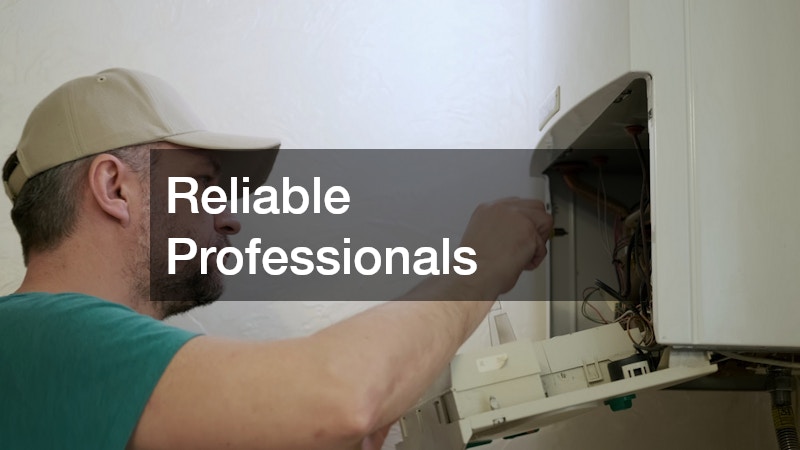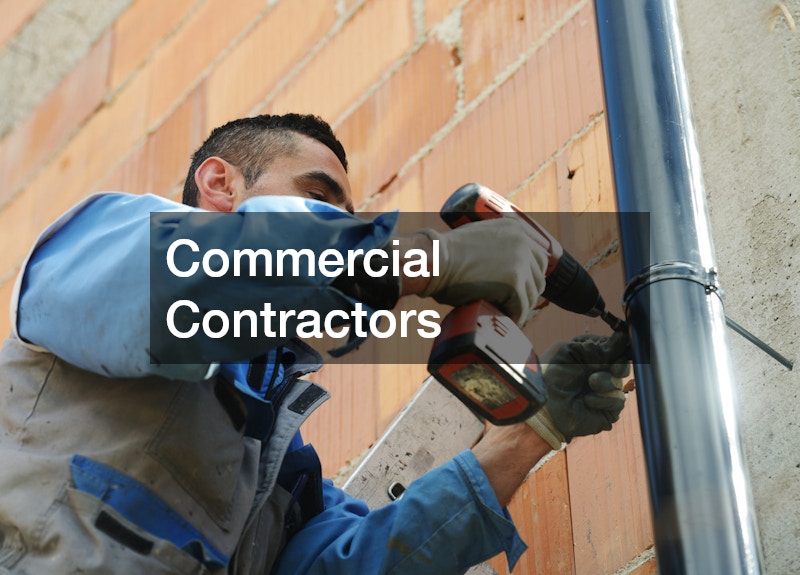Expanding into a local commercial property is an exciting step for any business. Whether you’re launching a new location, opening a branch office, or investing in commercial real estate, the process can be overwhelming without the right support. From dealing with utility installations to remodeling spaces and complying with local building codes, many aspects require expert handling. The key to a smooth transition is having a strong roster of trusted vendors who understand commercial spaces and can act quickly, efficiently, and professionally.
Commercial property expansion isn’t just about signing a lease or closing a sale; it’s about transforming a space to meet your business’s operational needs. This transformation requires the collaboration of numerous professionals—contractors, service technicians, installers, and logistics companies—each with a distinct role in the process. Trying to manage all these pieces without clear contacts in place can lead to delays, extra costs, and compromised results.
That’s why having go-to vendor contacts is crucial. The following list identifies 12 important vendor categories that can simplify your expansion into a local commercial property. Each section outlines one vendor type, includes a recommended service to look for, and highlights how they can specifically support your commercial real estate goals.
Whether you’re retrofitting an office, upgrading safety systems, or ensuring the space is move-in ready, these vendors will save you time and stress. By building these relationships early, you’ll be better positioned to hit the ground running with your new property and make your commercial expansion a resounding success.
1. Reliable Professionals

Having access to a reputable plumbing service is essential when moving into any local commercial property. Whether it’s ensuring proper drainage, installing new fixtures, or handling emergency repairs, plumbing infrastructure is foundational to operational success. When evaluating a plumbing provider, choose a team experienced in commercial-grade systems. This includes everything from multi-bathroom setups to kitchen installations for businesses in hospitality or food service.
For your expansion, a plumbing vendor should be proactive in assessing potential risks, suggesting efficient water use solutions, and helping with code compliance. A great plumbing partner won’t just react to problems but will help you design systems that meet long-term business needs. Additionally, many municipalities have strict regulations for commercial plumbing—an experienced professional will keep you compliant and avoid delays.
Ultimately, when plumbing is overlooked, small leaks can turn into major issues. Having a dependable plumbing contact from day one can make your transition into a new local commercial property much more seamless, helping to avoid downtime and unplanned expenses.
2. Skilled Remodelers
Though typically associated with residential projects, a home remodeler can bring creativity and craftsmanship to transforming your local commercial property. Whether repurposing existing office layouts or updating storefront aesthetics, remodelers often excel at customized work that traditional commercial contractors may overlook.
Remodelers pay attention to visual impact and user experience, which are key for customer-facing businesses. They’re often highly skilled in flooring, lighting, cabinetry, and decorative finishes. These elements matter greatly in medical clinics, salons, boutique shops, and other service industries where ambiance and layout affect customer retention.
A good remodeler will collaborate with your commercial architect or designer, making sure the vision is executed on time and within budget. They’ll also source materials efficiently, often getting better rates than you could find on your own. With their help, your local commercial property can feel polished, inviting, and tailored to your brand.
Hiring the right remodeler means bridging the gap between structural necessities and design sensibilities—a huge asset during expansion.
3. Maintenance and Inspection Experts
One of the most overlooked yet critical services for any local commercial property expansion is regular roof maintenance services. Whether you’re acquiring an older structure or maintaining a newly built facility, the roof is your first defense against weather, temperature shifts, and water damage.
Qualified roofers will evaluate the existing condition, identify areas of concern, and suggest preventative measures. For businesses moving into industrial, retail, or office spaces, this ensures that leaks, structural rot, and insulation issues don’t undermine your investment. Preventative maintenance is also cheaper than reactive repairs.
Vendors offering roof inspections should provide documentation for insurance purposes and help establish a service schedule. This adds to your property’s long-term value and appeal. With commercial properties especially, even a minor leak can quickly evolve into a major disruption, impacting operations, damaging equipment, or even compromising safety codes.
By hiring a vendor for reliable roof maintenance services, you’ll secure peace of mind and protect your local commercial property against unexpected repairs and weather-related emergencies.
4. Commercial Contractors

Unlike standard roofers, a commercial roofing contractor specializes in large-scale and technically complex roofing systems. These professionals are especially critical when expanding to or upgrading a local commercial property. Whether it’s flat roofing, metal installations, or green roof solutions, they bring the right tools, permits, and crew.
You’ll want to choose a vendor who understands load requirements, HVAC integration, and waterproofing solutions. Commercial roofs often need detailed engineering and must pass stringent municipal inspections. Contractors who focus on commercial projects are also more familiar with building codes and can manage safety protocols effectively.
Roofing contractors can also assist with insurance claims, scheduled upkeep, and energy-efficient roofing designs—an often-overlooked feature that can significantly reduce your utility bills. Working with an expert contractor during the early stages of your expansion helps you build a reliable infrastructure from the top down.
Your local commercial property deserves the best care and strategic oversight. Investing in a professional commercial roofing contractor can save time, reduce risks, and provide long-term cost savings.
5. Power Your Business
No commercial build-out is complete without a licensed electrician. Electrical systems need to be robust and future-ready, supporting computers, lighting, HVAC, and sometimes even industrial-grade equipment. For your local commercial property, this means working with an electrician who understands both current needs and long-term scalability.
A commercial electrician can help you optimize energy consumption, install security lighting, and ensure safety compliance. They’re also invaluable when you’re configuring outlets, server rooms, or emergency lighting systems. Timely wiring and inspections prevent fire risks, outages, and downtime.
As you develop your space, these experts help integrate smart systems, automate energy use, and reduce utility costs. Many businesses also use electricians to install solar panels or EV charging stations, aligning with green initiatives.
Reliable electrical support transforms your local commercial property into a safe, functional environment. Make sure you’re partnering with professionals who not only meet code but help exceed your operational expectations.
6. Expediter Services
One often overlooked but highly valuable vendor in a local commercial property expansion is a permit expediter. Navigating municipal regulations can be a nightmare—especially when dealing with multiple inspections and approvals. Permit expediters streamline the process.
These professionals understand local laws, application procedures, and timelines. They help ensure that every contractor, installer, and inspector operates in alignment with local ordinances. Delays in permits can postpone your opening, inflate costs, and trigger legal issues.
Using a permit expediter ensures that your project moves forward efficiently. They can also anticipate potential red flags in your application process, saving you from re-submissions or denials. Whether you’re installing signage or upgrading infrastructure, a permit expediter can keep your project on track and within budget.
Having a reliable permit specialist as part of your local commercial property vendor list guarantees smoother transitions, fewer surprises, and faster project completion.
7. Entryway Installers

Installing sliding glass doors or custom entryways can transform the look and accessibility of your local commercial property. Whether you run a restaurant, showroom, or office space, the entry sets the tone for clients and employees alike.
Specialized door installers not only provide aesthetics but also offer energy efficiency, security, and code-compliance options. Features like auto-locking mechanisms, ADA-compliant access, and durable weather sealing are crucial for commercial environments.
A professional vendor will handle everything from removing old fixtures to securely mounting new doors, aligning frames, and integrating alarm systems. Sliding doors also offer natural light advantages that can reduce lighting costs.
For a standout entrance that welcomes clients and complies with regulations, a vendor skilled in door systems is essential. They’ll help reinforce the style and security of your local commercial property while enhancing usability.
8. Renovation Experts
An often underestimated aspect of your commercial setup is a professionally executed bathroom remodel. Restrooms in your local commercial property must balance function, accessibility, and cleanliness. Whether for public use or employee-only access, a well-designed bathroom supports hygiene and improves visitor perception.
Bathroom specialists help redesign layouts, upgrade plumbing fixtures, and ensure ADA compliance. They’ll install water-saving toilets, hands-free sinks, and non-slip flooring. Efficient restrooms reflect well on your brand and reduce water usage and maintenance costs.
A qualified remodeler will also help with ventilation, odor control, and efficient space planning—critical for high-traffic commercial spaces. During your expansion, don’t underestimate the role bathrooms play in client satisfaction and employee comfort.
This one upgrade can dramatically elevate the functionality of your local commercial property.
9. Repair Services
When taking over a new local commercial property, check that your heating, ventilation, and air conditioning systems are in top shape. Engaging a trusted partner for HVAC repairs ensures climate control, energy efficiency, and indoor air quality.
Outdated or malfunctioning HVAC systems can increase operating costs and create uncomfortable environments. Commercial HVAC vendors will inspect ductwork, thermostats, compressors, and filters. They may also suggest energy-efficient upgrades or smart controls to reduce your environmental footprint.
Seasonal tune-ups and emergency repair readiness are key to smooth operations. With expert support, you’ll avoid the downtime and customer dissatisfaction that can result from sudden HVAC failures.
By incorporating HVAC professionals early in your expansion plan, your local commercial property stays comfortable, safe, and sustainable year-round.
10. The Value of Commercial

Another smart investment when expanding into a local commercial property is hiring a commercial real estate consultant. These professionals provide market analysis, zoning insight, and property evaluations, ensuring your investment is sound.
Consultants help you identify suitable neighborhoods, compare lease versus buy options, and negotiate contracts. Their insights minimize your risk while aligning your business goals with physical space.
For multi-location expansions or first-time property buyers, consultants provide a strategic advantage. They also connect you with other professionals, including inspectors, surveyors, and title agents.
Having one on your team helps you make informed, data-driven decisions about your local commercial property, from selection to acquisition and renovation.
11. Emergency Restoration
Accidents and natural disasters can derail even the best-laid expansion plans. That’s why a trusted water damage mitigation vendor should be part of your local commercial property support system. Whether it’s flooding, mold, or fire-related damage, these experts respond quickly to restore safety and order.
They work with insurance companies, perform deep sanitation, and prevent further structural deterioration. A fast response minimizes revenue loss and prevents downtime.
By partnering with a reliable mitigation service, you’ll be able to bounce back quickly from emergencies and maintain confidence in your property’s resilience.
12. Smooth Transitions
Among the final but most critical steps in expanding to a local commercial property is the physical move itself. Commercial moving companies provide logistics support, equipment handling, and secure transportation for business assets.
These companies understand the complexity of relocating tech, furnishings, inventory, and sensitive documents. They also offer packing services, insurance coverage, and setup assistance to get your workspace operational faster.
Coordinating a move on your own invites delays, losses, and stress. Professional movers work with your schedule, reduce risk, and bring efficiency to your transition. From heavy equipment to delicate IT systems, they handle it all.
When you include a trusted commercial mover in your vendor list, your move into a local commercial property becomes smoother, more predictable, and worry-free.
Expanding into a local commercial property is no small feat. It demands vision, planning, and a strong network of service providers who can execute your plans efficiently and on time. The vendors outlined in this guide—from plumbers and electricians to HVAC professionals and movers—are instrumental in building a successful foundation for your business growth.
By proactively assembling these contacts, you mitigate risks, control costs, and streamline your operations. Whether it’s the structural integrity provided by a roofing contractor or the ambiance curated by a bathroom remodeler, every vendor plays a critical role in shaping your new commercial space.
Ultimately, the success of your expansion doesn’t just depend on location or budget—it depends on the strength of your team. That team includes not only your staff but also the trusted vendors who will help bring your vision to life. So take the time to vet these professionals, establish communication early, and build long-term relationships that support your business well beyond the initial move.
With these 12 vendor contacts in place, your local commercial property expansion can be a smooth, organized, and highly rewarding journey.



